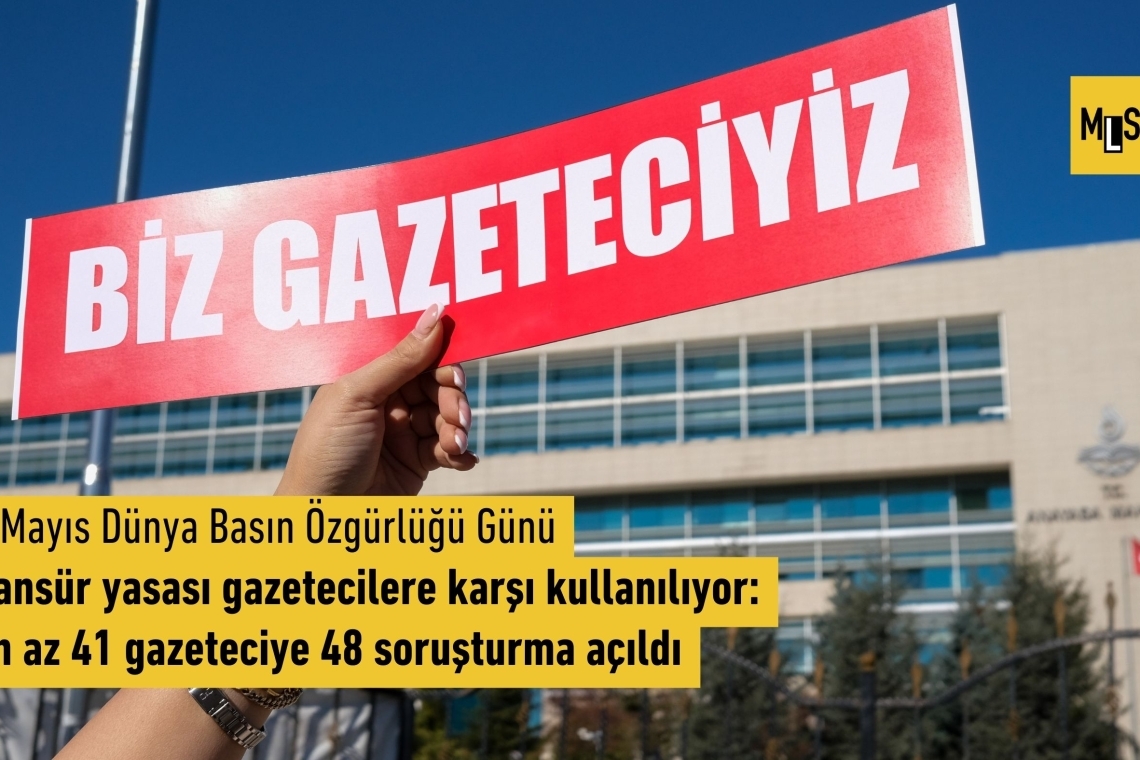Deniz Tekin
According to data from MLSA and the Turkish Journalists Union (TGS), Turkey's controversial "misleading information" law, codified as Article 217/A of the Turkish Penal Code (TCK) and often referred to as the Censorship Law, has been extensively applied against journalists. Since its enactment in October 2022, this law has led to 47 investigations involving 41 journalists due to their reports, comments, or writings.
The law, which criminalizes the dissemination of misleading information to the public, was upheld by Turkey's Constitutional Court on November 8, 2023, despite an appeal for its annulment. This decision comes amidst widespread criticism that the law is systematically used to silence journalists and hinder news reporting. For example, following the February 6, 2023, earthquakes centered in Kahramanmaraş, several journalists who reported on the event, hosted programs, or made social media posts were charged under this law. Notably, journalist Fırat Bulut was prosecuted for his report on a riot and subsequent fire started by inmates at the Elbistan Type E Closed Prison Facility in the earthquake-stricken districts of Pazarcık and Elbistan. During the trial, documentation from the Elbistan District Gendarmerie Command verified that the inmates had indeed rioted and set fire to blocks A and B of the prison on the dates reported by Bulut.
The application of this law has resulted in numerous detentions and legal actions: ten journalists, including Mehmet Güleş, Fırat Bulut, Serdar Akinan, İlknur Bilir, Dinçer Gökçe, Cengiz Erdinç, Sinan Aygül, Ali İmat, İbrahim İmat, and Tolga Şardan, were detained. Of these, journalists Sinan Aygül, Ali İmat, İbrahim İmat, and Tolga Şardan were arrested. While five of the fifteen journalists formally charged under this statute were acquitted, the cases against the remaining nine are ongoing.
Additionally, investigations against 18 other journalists including Mehmet Güleş, Ahmet Sesli, Aslıhan Gençay, Ahmet Kanbal, Serdar Akinan, Canan Kaya, İsmail Arı (facing two investigations), Emre Orman, Hüsniye Karakoyun, Mahmut Karakoyun, Medine Mamedoğlu, Şükran Ekinci, and Zeynep Kuray have resulted in decisions not to pursue charges. However, ongoing investigations continue to affect several journalists such as Mir Ali Koçer, Fırat Bulut, Ahmet Kanbal, İsmail Arı, Yüsra Batıhan, Sevilay Yılman, Zübeyde Sarı (facing two investigations), Mehmet Sıddık Güler, Zülal Kalkandelen, Cengiz Erdinç, Uğur Koç, Uğur Şahin, Onur Öncü, İlknur Bilir, Abdullah Aslan, İsmail Saymaz, and Duygu Kıt.
Journalist Ahmet Kanbal, facing three investigations, criticized the law for its detrimental impact on journalism, asserting that it compels journalists to constantly consider the potential repercussions of their reporting. His defense statements in court emphasized the burdensome requirement to disprove prosecutors' allegations rather than demonstrating the accuracy of their news stories.
Gökhan Özbek’s lawyer, Gizay Dulkadir, argued that the law had found an excessively broad application area, validating opposition concerns. Dulkadir criticized the continuous monitoring and prosecution of dissenting journalists through the "virtual patrol" practice, which he claimed persisted without legal basis even after being declared unconstitutional. This approach, according to Dulkadir, has transformed the disinformation law into a tool that not only suppresses journalists but also blatantly infringes upon the public's right to information.



